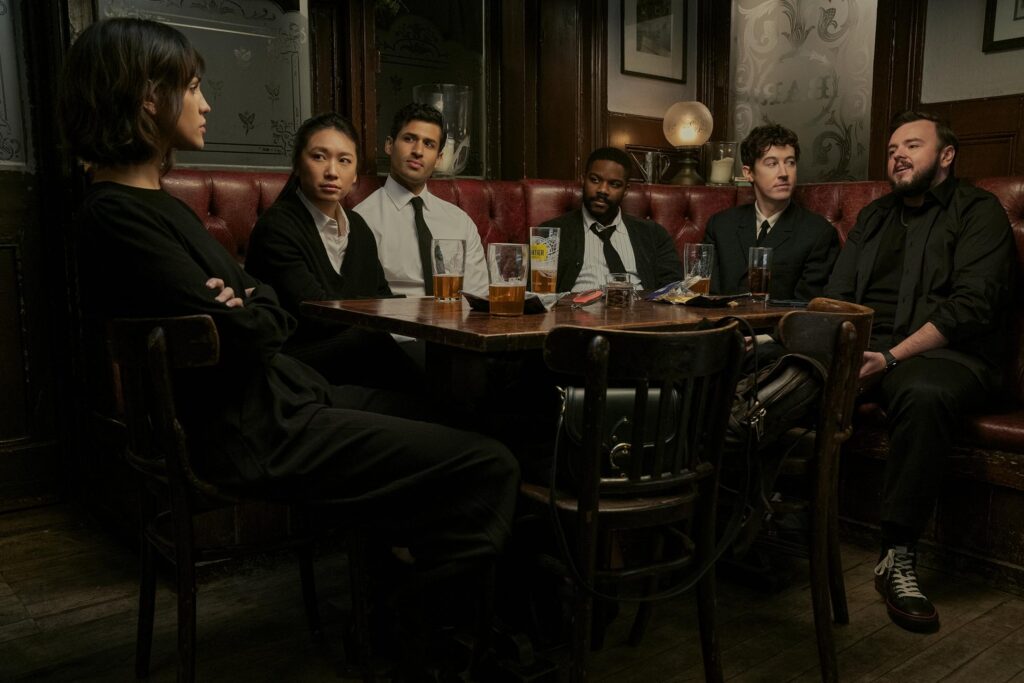· Tara Price · Lifestyle
Beyond the Quantum Veil: The Making and Impact of Netflix’s 3 Body Problem
![<p>Netflix’s “3 Body Problem” has taken the world by storm, merging quantum conundrums with cinematic splendor. This series, with its international ensemble, a plot that weaves through time, and a foundation in the enigmatic realm of quantum mechanics, has seized the global audience’s imagination. Let’s embark on an exploratory journey into the creation, narrative, casting, […]</p>](/_image?href=https%3A%2F%2Fneonmusic.online%2Fwp-content%2Fuploads%2F2024%2F03%2F444-2-6.jpg&w=900&h=506&f=webp)
Netflix’s “3 Body Problem” has taken the world by storm, merging quantum conundrums with cinematic splendor. This series, with its international ensemble, a plot that weaves through time, and a foundation in the enigmatic realm of quantum mechanics, has seized the global audience’s imagination. Let’s embark on an exploratory journey into the creation, narrative, casting, reception, and potential continuum of this audacious endeavour.
From Literary Genius to Cinematic Vision
The journey from Cixin Liu’s Hugo Award-winning novel “The Three-Body Problem” to the screen was met with scepticism, as many deemed the book’s intricate quantum puzzles and expansive narrative ‘unfilmable.’ Yet, the formidable trio of David Benioff, D.B. Weiss (renowned for their work on “Game of Thrones”), and Alexander Woo (“True Blood,” “The Terror”) embraced this challenge with fervor.
Together, they masterfully translated the novel’s hard science fiction elements into a digestible and exhilarating series that not only respects the depth of the source material but also broadens its appeal to captivate a global audience. Their collective storytelling prowess has woven a narrative tapestry that seamlessly blends the complex scientific and philosophical themes of Liu’s work with the cinematic spectacle, marking a significant milestone in the realm of science fiction adaptations.
A Tale of Time, Science, and Humanity
Building on this creative foundation, the series begins with a haunting enigma: a spate of suicides among the world’s leading physicists. This mystery unravels a tale stretching back to the Chinese Cultural Revolution, leading to present-day scientific anomalies. The characters, from nanotechnology whizzes to anti-terrorism operatives, are the beating heart of this intricate narrative tapestry.
Delving into Character: The Cast’s Journey

As we delve deeper into the series, the ensemble cast of “3 Body Problem” embarked on a profound journey to embody their complex characters, each bringing a unique perspective and depth to their roles. With an international cast hailing from diverse backgrounds, the actors delved into the philosophical and scientific intricacies of the series, guided by the vision of creators David Benioff, D.B. Weiss, and Alexander Woo.
- John Bradley (Jack Rooney) described his character as an independent thinker from a working-class background. Bradley’s preparation involved embracing a childlike imagination, especially for scenes set in virtual reality worlds, requiring him to perform against a 360-degree green screen.
- Jess Hong (Jin Cheng) portrays one of the Oxford Five, emphasising Jin’s relentless drive and ambition, coupled with a deep empathy that makes her relatable to the audience.
- Eiza González (Auggie Salazar) brings to life a pioneering scientist, embodying the essence of a 21st-century woman. González appreciated the adaptation’s expansion to include diverse cultures and nationalities.
- Benedict Wong (Da Shi) described his character as an unorthodox counterterrorism operative. Wong’s preparation included consulting with a real counterterrorism expert to understand the nuances of his role.
- Zine Tseng and Rosalind Chao share the role of Ye Wenjie, portraying her at different stages of life. Both actors emphasised the importance of understanding Ye’s background in astrophysics and her pivotal role in the story’s unfolding.
- Alex Sharp (Will Downing) found intrigue in his character’s psychological state, facing life’s greatest challenge.
- Jovan Adepo (Saul Durand) related to his character’s potential and the frustration of unfulfilled drive, aiming to portray an underdog that audiences would root for.
- Liam Cunningham (Thomas Wade) took a unique approach by avoiding the books and focusing solely on the scripts, aiming to bring an enigmatic intelligence chief to life without preconceived notions from the source material.
Through their dedicated preparation and personal connections to their roles, the cast of “3 Body Problem” offers a multi-dimensional portrayal of characters navigating the existential threats and philosophical quandaries at the heart of the series.
The Critical Spectrum
Reflecting on the series’ reception, reactions to “3 Body Problem” span from adulation, celebrating its grand narrative ambition, to critique, pointing out its dense scientific layers and perceived character shallowness. Yet, it has solidified its spot atop Netflix’s global charts, igniting conversations and debates.
Global Reception and Cultural Controversy
Amidst this critical spectrum, the Netflix adaptation of “The Three-Body Problem” has ignited a range of reactions, particularly in China, where the series has become a focal point for online discussions and nationalist sentiment. The depiction of the Cultural Revolution, a sensitive and tumultuous period in China’s modern history, has split opinions among viewers. A significant point of contention has been the show’s opening scene, which takes place against the backdrop of Mao Zedong’s Cultural Revolution at Tsinghua University and features a public denunciation and beating of a physics professor.
Conversely, others have defended the show, arguing that the scene in question closely aligns with the narrative of the book and represents a truthful recounting of historical events. The debate extends to the author, Liu Cixin, who had initially intended to open the novel with scenes from the Cultural Revolution but had to adjust due to concerns about government censorship. Ken Liu, the translator of the English version of the book, approved the placement of these scenes at the beginning, emphasizing Ye Wenjie’s disillusionment, which plays a crucial role in the story’s progression.
In response to the controversy, episode director Derek Tsang revealed in an interview that he sought secondhand accounts from the descendants of individuals who experienced the Cultural Revolution themselves, aiming for a portrayal grounded in real experiences. The series creators, aware of the potential backlash, maintained a neutral stance regarding China. In an interview, Co-showrunner Alexander Woo said, “None of us are writing with any particular axe to grind in relation to China,” emphasising their commitment to faithfully recreating the vibrancy and horrors found in Cixin’s original story. While bracing, we deemed the opening sequence essential for establishing the season’s momentum and stakes, leaving the question of sensitivity to individual interpretation.
Despite the polarised views, there are calls for a more nuanced reception of cultural products, urging audiences to appreciate the merits of different adaptations without resorting to conflict. This diverse range of reactions underscores the complex interplay between cultural representation, historical sensitivity, and creative adaptation in bringing “The Three-Body Problem” to a global audience.
The Quantum Budget Dilemma and Adaptation Challenges
With a staggering $20 million per episode, “3 Body Problem” is one of Netflix’s most ambitious projects, reflecting the series’ high production values. This significant financial investment underscores the challenges of creating a visually stunning series that captures the essence of Liu Cixin’s complex novels. The adaptation process was a formidable task, given the intricate exploration of quantum physics and the expansive narrative that spans different timelines and characters. The series had to creatively navigate the blending of science and religion, particularly against the backdrop of China’s Cultural Revolution. Balancing the scientific and philosophical depth of the novels with the need for accessibility and engagement with a broader audience was a key challenge the creators faced.
Future Seasons and Story Arcs
Despite mixed reviews, the creators are already preparing for “3 Body Problem Season 2,” indicating a commitment to the series’ continuation. Showrunners hint at a pivotal scene in the upcoming season that could redefine the series’ narrative stakes, akin to the “Red Wedding” in “Game of Thrones.” This suggests that future seasons will delve into more complex and ambitious story arcs, expanding the narrative’s scope. The series is poised to explore global pandemonium and the villains’ plans in greater detail, potentially leading to a variety of responses from characters and societies, adding depth to the exploration of science, religion, and existential threats.
Final Thoughts: A Quantum Success?
The “3 Body Problem” is a bold leap into adapting a science fiction masterpiece, offering a drama that doubles as a primer to quantum physics. For aficionados of hard-hitting sci-fi or those seeking a compelling narrative, this series is a quantum leap worth taking.
You might also like:








